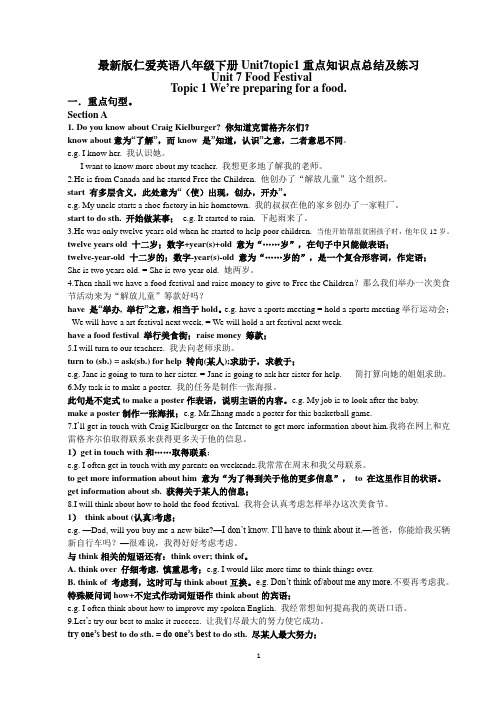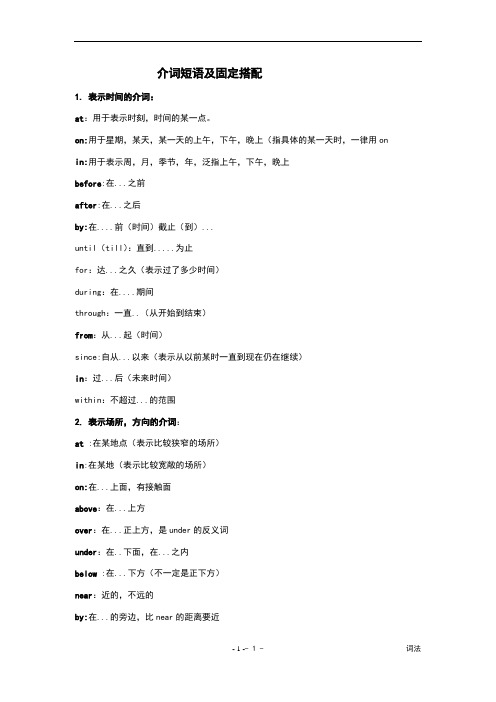in_hospital和in_the_hospital的区别
最新版仁爱英语八年级下册Unit7topic1重点知识点总结及练习--最新版

最新版仁爱英语八年级下册Unit7topic1重点知识点总结及练习Unit 7 Food FestivalTopic 1 We’re preparing for a food.一.重点句型。
Section A1.Do you know about Craig Kielburger? 你知道克雷格齐尔们?know about意为“了解”,而know 是”知道,认识”之意,二者意思不同。
e.g. I know her. 我认识她。
I want to know more about my teacher. 我想更多地了解我的老师。
2.He is from Canada and he started Free the Children. 他创办了“解放儿童”这个组织。
start 有多层含义,此处意为“(使)出现,创办,开办”。
e.g. My uncle starts a shoe factory in his hometown. 我的叔叔在他的家乡创办了一家鞋厂。
start to do sth. 开始做某事;e.g. It started to rain. 下起雨来了。
3.He was only twelve years old when he started to help poor children. 当他开始帮组贫困孩子时,他年仅12岁。
twelve years old 十二岁;数字+year(s)+old 意为“……岁”,在句子中只能做表语;twelve-year-old 十二岁的;数字-year(s)-old 意为“……岁的”,是一个复合形容词,作定语;She is two years old. = She is two-year old. 她两岁。
4.Then shall we have a food festival and raise money to give to Free the Children?那么我们举办一次美食节活动来为“解放儿童”筹款好吗?have 是“举办, 举行”之意,相当于hold。
in the的用法口诀

in the的用法口诀一、介绍"In the"的用法在英语中,使用介词是非常常见的一种语法现象。
而其中,介词"in"的用法尤为广泛和多样。
今天我们就来学习一下关于"in"的一些常见用法和口诀。
二、in 表示位置或空间1. in表示在某个地方或位置上。
例如:in the park (在公园里), in my room (在我的房间里)。
2. in表示与周围环境有接触。
例如:in the water (在水里),in the air (在空气中)。
3. in表示位于容器或物体中。
例如:in a box (在盒子里),in a car (在车内)。
三、in 表示时间1. in + 年代/季节:in 2010(在2010年),in summer(在夏季)。
2. in + 时间段/时期:in the morning(早晨),in two weeks(两周后)。
3. in + 具体日期:in July 5th (7月5日), in Christmas Day(圣诞节)。
四、特殊短语及注意事项1. 在某个范围内: in my opinion(依我看), in general(一般来说)。
2. 在进行某个活动时使用特定工具:write something down on paper(把东西写到纸上)。
3. 不加冠词:in bed(在床上),in hospital(在医院)。
4. 注意"in"和其他介词的区别:- in the room(在房间里),on the table(在桌子上),under the chair(在椅子下)。
五、总结通过学习本文所述的"In the"的用法,我们可以更准确地运用这一小单词。
记住口诀并不难,只要不断练习和运用,在日常表达中就能得心应手。
熟能生巧,相信大家很快就能灵活掌握"in"的正确用法了!。
介词短语及固定搭配

介词短语及固定搭配1. 表示时间的介词:at:用于表示时刻,时间的某一点。
on:用于星期,某天,某一天的上午,下午,晚上(指具体的某一天时,一律用on in:用于表示周,月,季节,年,泛指上午,下午,晚上before:在...之前after:在...之后by:在....前(时间)截止(到)...until(till):直到.....为止for:达...之久(表示过了多少时间)during:在....期间through:一直..(从开始到结束)from:从...起(时间)since:自从...以来(表示从以前某时一直到现在仍在继续)in:过...后(未来时间)within:不超过...的范围2. 表示场所,方向的介词:at :在某地点(表示比较狭窄的场所)in:在某地(表示比较宽敞的场所)on:在...上面,有接触面above:在...上方over:在...正上方,是under的反义词under:在..下面,在...之内below :在...下方(不一定是正下方)near:近的,不远的by:在...的旁边,比near的距离要近between:在两者之间among:在三者或者更多的之中around:环绕,在...的周围,在....的四周in front of:在...的前面behind:在...后边in:在..之内,用于表示静止的位置into:进入out of :和into一样,也表示有一定的运动方向along:沿着across:横过(平面物体)through:贯通,通过to :达到..地点(目的地)或方向for:表示目的,为了.....from:从...地点起3. 其他介词with:和..在一起;具有,带有;用某种工具或方法in:表示用什么材料(例如:墨水,铅笔等)或用什么语言。
表示衣着.声调特点时,不用with而用in。
by:通过...方法,手段of:(属于)...的,表示...的数量或种类from:来自(某地,某人),以...起始without:没有,是with的反义词like :像...一样as :作为;担任;当... ...时against:反对,靠着about:关于,各处,四周;询问某人,某物的情况或提出建议4.介词和各类词搭配构成的介词短语1)介词与动词搭配arrive in/at到达ask for要,请求do well in在……方面做得好give in投降go on 继续hear from收到……来信 hear of听说help sth.帮助……做laugh at嘲笑 learn from向……学习leave for离开一地去另一地talk to与……谈话 go in for从事,致力于put up穿上,挂上 take down拿下,取了look at(有意识地)看 speak to对某人说send for派人去请shout at大声叫喊,吼叫take away拿走,带走think of考虑,关心turn into把……变成wait for等候,等待take off脱下,起飞turn on/off打开(关上)listen to听look after照顾,照看look for寻找 look like 看上去像get to 到达 point to 指着……fill with充满,装满 begin with以……开始deal/do with处置,对待meet with偶尔遇见,遭遇 pass on传递belong to属于write to写信给……call on号召,访问,邀请die of死于…… depend on依靠,依赖smile at向……微笑 believe in信任look out向四下看,到处看2)介词与名词搭配with a smile带着微笑at night在晚上 at noon在中午at hospital在医院at home在家at first首先,起初at last最后,终于at the meeting在会上 at least至少in surprise惊奇地 at once立刻,马上at the foot of在……脚下at all压根儿at dinner在吃正餐 at the table在桌子旁at work在工作at school在学校at the back of在……后面at the moment 此刻at the beginning of在……开始 at the end of在……结尾at the same time同时,然而by hand用手,手工,亲手 by the end of到……结束时by train乘火车by bus乘公共汽车day by day日复一日one by one一个接一个 by spaceship乘坐宇宙飞船by the way顺便说说/问问in a low voice大声地in a word总而言之,一句话in trouble处于困境in fact事实上in the street在街上in the end最后,终于in space在空间 in no time立刻,很快in order按顺序,整齐,正常in order to为了,以便in the day在白天in line成一直线in a short while不久in all总共,总计 in town在城里in silence不作声in time及时 in bed卧床in life一生中in front of在……前面 in a hurry匆忙,急忙in a minute一会儿in English用英语 in the middle在中间 in the sun在阳光下in a tree在树上out of breath上气不接下气out of sight消失,看不见on time准时,按时on duty值日on the left/right在左/右边on one’s way to在……的路上on foot 步行on the one handon the other hand一方面……另一方面on the other side of在……的另一边on the radio通过无线电广播to this day直到今天to one’s surprise/joy使某人吃惊/高兴3)介词与形容词、过去分词和动词等搭配be born in出生于……be good at擅长……be made of由……制成be angry with sb. 对某人生气be angry at sth. 为某事生气be pleased with sb. 对某人感到满意be satisfied with sth.对某事感到满意be surprised at对……感到惊奇/诧异be tired of讨厌……/厌倦……be interested in对……感兴趣be proud of以……为自豪/骄傲be full of充满…… take/catch hold of抓住be sure of确信…… take part in参加break into 闯入take care of照顾,关心,保管be busy with忙于……be strict with对……严格要求catch up with跟上,赶上 have nothing to do with与……无关go to school上学 go to bed/sleep睡觉give a lesson to给……上课go to the cinema 去看电影be kind to sb. 对某人友好say hello to向……问好look forward to盼望,期待keep out of不让进入 go on strike罢工be used to习惯于……5.看似相同,但意义有别的词组:1)介词词组(1) at table在进餐at the table在桌子旁(=beside the desk)(2) at desk在读书或做作业at the desk在书桌旁(3) at school在校上学(指学生)at the school在学校(指教职工)(4) in front of the bus在公共汽车的前面(不在车上)in the front of the bus在公共汽车的前部(在车上)(5) at sea在航海中at the sea在海边(6) by day白天by the day按日,论日(7) behind time误期behind the time落后于时代(8) in class在上课,在课内in the class在这个班(9) in bed 卧床,在睡觉in the bed在床上(10) in prison坐牢in the prison在监狱(11) in red穿着红色的衣服in the red负债,亏损(12) in hospital住院(指病人)in the hospital(因事)在医院(13) in office在办公,执政in the office在办公室(14) in secret秘密,私下in the secret参入秘密,参入阴谋(15) in place of 代替,而不是in the place of在……地方(16) in case of万一,如果in the case of就……来说,至于(17) of age成年人of an age同龄人(18) out of office离职out of the office离开办公室(19) out of prison(因犯罪)出狱out of the prison(因事)从监狱出来(20) out of question毫无疑问out of the question不可能,办不到2)含有介词的动词词组(1) come out of hospital(病好)出院come out of the hospital(因事)从医院里出来(2) come out of prison(刑满)释放come out of the prison(因事)从监狱里出来(3) go to school去上学 go to the school(因事)去学校(4) go to college上大学 go to the/a college去一所学校(办事)(5) go to bed上床睡觉 go to the bed去床边(6) go to hospital去住院 go to the hospital(因事)去医院(7) go to prison去坐牢 go to the prison(因事)去监狱(8) go to sea当海员 go to the sea去海边(9) go to court起诉 go to the court(因事)去法庭(10) go to church做礼拜 go to the church(因事)去教堂(11) keep house管理家务 keep the house守在家里(12) take place发生 take the place代替3)有无冠词,意义无多大区别的介词词组(1)at(the)most至多 (2)at(the)first起初 (3)all(the)day 整天(4)catch(a)cold感冒 (5)in(the)future 将来 (6)in(the)memory of纪念(7)go to(the)office 上班,去办公室 (8)go to(the)market 赶集,去市场(9)on(a)holiday 在度假(10)(the)day before yesterday 前天(11)(the)most of 大多数必背短语1)at once 立刻 2)at last 最后3)at first 起先,首先4)at the age of… 在……岁时5)at the end of… 在……之末6)at the beginning of… 在……之初7)at the foot of… 在……脚下 8)at the same time 同时9)at night/noon 在夜里/中午10)with one's help 在某人的帮助下,由于某人的帮助11)with the help of … 在……的帮助下12)with a smile 面带笑容 13)with one's own eyes 亲眼看见14)after a while 过了一会儿15)from now on 从现在起 16)from then on 从那时起17)far example 例如 18)far away from 远离19)from morning till night 从早到晚20)by and by 不久 21)by air mail 寄航空邮件22)by bike/air/train/bus 骑自行车/乘飞机/火车/汽车 23)by ordinary mail 寄平信24)by the way 顺便说 25)by the window 在窗边26)by the end of… 到……底为止 27)little by little 逐渐地28)in all 总共 29)in fact 事实上30)in one's twenties 在某人二十几岁时 31)in a hurry 匆忙32)in the middle of 在……中间 33)in no time (in a minute) 立刻,很快34)in time (on time) 及时 35)in public 公众,公开地36)in order to 为了…… 38)in the sun 在阳光下39)in the end 最后,终于 40)in surprise 惊奇地41)in turn 依次42)of course 当然 43)a bit (of) 有一点儿44)a lot of 许多 45)a little 一点儿46)on one's way to 某人在去……的路上 47)on foot 步行,走路48)a talk on space 一个关于太空的报告 49)on the other hand 另一方面50)at/on the weekend 在周末 51)on the left (right) 在左(右)边52)on the other side of 在……另一边 53)on the radio 通过收音机(无线电广播)。
定冠词the的用法大盘点

定冠词the的用法大盘点来源:微信号中国日报网双语新闻(Chinadaily_mobile)The是一块砖,哪里需要哪里搬,童鞋们经常看见名词就加the,反正有就更好,没有也无伤大雅。
殊不知,你们作文里满屏的the是外教最头痛的事。
双语君就记得学生时代,外教总说我们滥用the。
痛定思痛,双语君决定来和大家一起梳理一遍定冠词the(definite article)的用法。
一.这些词前不能加the考虑到the经常被滥用,我们先说说不能加the的情况。
1.抽象意义◆有些物质名词和抽象名词前永远用零冠词(Zero article,即不适用任何冠词),即使有形容词,也用零冠词。
常见的有:weather, progress, fun, advice, news, information, luck, furniture, wealth, honesty 等。
注意:man 表示“人类”和word 表示“音讯”时一般不加冠词,如:➤It is well known that man has a very close relationshipwith environment.众所周知,人类与环境关系非常密切。
➤Word has it that the food costs an arm and a leg.听说那里的食物贵得离谱。
◆表示抽象概括意义时,不可数名词和复数名词使用零冠词,例如:➤Books are my best friends.书是我的好朋友。
➤Love is all you need.你需要的只是爱。
◆表示一种抽象的状态,比如to/at sea, to/at/out of work, in/out of town, in/out of office等。
➤He used to spend several months at sea.他曾出海几个月。
➤I go to work every day. I was at work yesterday.我每天上班。
雅思听力冠词盘点【不定冠词+定冠词+零冠词】

雅思听力冠词盘点【不定冠词+定冠词+零冠词】在雅思听力备考中考生如何快速理解听力内容,首先需要有一个好的词汇基础,下面店铺为大家分享雅思听力冠词盘点【不定冠词+定冠词+零冠词】内容,方便在备考中学习与积累。
雅思听力冠词盘点【不定冠词+定冠词+零冠词】不定冠词:1. a用于辅音发音开头的词前, 如:a book; an用于元音发音开头的词前,如:an apple, an hour. 请区别:a useful machine, an umbrella, a “u”, an “h”。
1. a/an 用于单数可数名词前。
a book a boy a man a bird a dog an houran interesting book a big dog a dangerous aminal【练习】判断正误:a story( ) a bread ( ) a paper( ) a bag( )a pretty woman( ) a school ( ) a useful book ( )2.表示类别:这种用法是指某人或某物属于某一种类,或者指某一种类的人或物中的任何一个或一件,或者指某一种类的人或物,但不具体说明是何人或何物。
例如:That is a pen, not a pencil. 那是钢笔而不是铅笔。
(指属于某一种类)Give him a pear, please! 请给他一个梨。
(指某一种类中的任何一个)Listen! A boy is singing in the classroom.3.和 one 的区别: a/an 表示类别种类 One 强调数量a bus (表示是一辆公交车而不是一辆小汽车也不是火车)one bus (强调是一辆车而不是两辆或三辆)There is a cat under the chair. 椅子下面有一只猫。
(强调种类) There is one cat under the chair.椅子下边有一只猫。
新概念英语-第二册Lesson-33

Ahead 是副词,意思为 “在前面〞,在这里作 后
置定语,修饰light. Go ahead of her.〔走在她的前面。〕是一种动 态。而如果是静态的表示“在…之前〞,我们就
2.What did the girl do when the boat struck a rock?
She jumped into the sea.
3.How many miles did she swim that night?
She covered a distance of eight miles.
石
2-Listening and Reading
Questions on the test
1.What happened after the girl set out from the coast in a small boat one afternoon? She was caught in a storm.
land at the edge of a sea or lake) 是这三个词中最普通的一个,可指湖、 海等的岸:
the western shore of the Pacific 太平洋西岸
5、During that time she covered a distance of eight miles.
3、Towards evening, the boat struck a rock and the girl jumped into the sea.
rock n. 岩石,礁石;摇滚乐 山脉是由岩石构成的。 Mountains are made of rock. rock and roll 摇滚乐,摇滚舞
初一英语上各模块知识点

• 注意:如果指示代词this/that在问句中指人,那么回答 时一定用it,而不用指人的主格。Eg:Is this/that
your mother? Yes.it is./ No, it isn’t.
•
Unit2知识点
• Unit2知识点
• 1 有的动词变名词是在动词后加er, 以不发音的字母e结尾的,
• 4 go+动名词,表示“去做。。。” go shopping/ swimming/ fishing
• 5 so 与because .两者不能同时出现在一个句子中。 eg: Tom can’t come to school because he is ill.=Tom is ill, so he can’t come to school.
• 四、句式变换:1否定句:在be 后加not .2 一般疑问句:把be 提前。
• Eg: There isn’t a pen on the desk.
• isn’t. Is there a pen on the desk? Yes, there is./No, there
• 注意:肯定句中的some在否定和疑问句中变any.
只加r
teacher/worker/farmer/reader/writer
• 2 in/at hospital与in/at the hospital 的区别:前者指病 人住院,后者指在医院里,不是病人。Eg: Tom is ill in hospital. 汤姆生病住院了。Tom is a doctor in the hospital,汤姆在医院里是一个医生。
•3(1)在几年级几班级用in.
•(2)班级+数
Class Three
Unit 7 topic 1 重点知识点总结

Unit 7 Topic 1 Section A1.Do you know about Craig Kielburger? 你知道克雷格齐尔伯格?know about意为“了解”,而know 是”知道,认识”之意,二者意思不同。
如:I know her. 我认识她。
I want to know more about my teacher. 我想更多地了解我的老师。
2. He is from Canada and he started Free the Children. 他创办了“解放儿童”这个组织。
start有多层含义,此处意为“(使)出现,创办,开办”。
如:My uncle starts a shoe factory in his hometown. 我的叔叔在他的家乡创办了一家鞋厂。
start to do sth.开始做某事;如:It started to rain. 下起雨来了。
3. He was only twelve years old when he started to help poor children. 当他开始帮组贫困孩子时,他年仅12岁。
twelve years old十二岁;数字+year(s)+old 意为“……岁”,在句子中只能做表语;twelve-year-old 十二岁的;数字-year(s)-old 意为“……岁的”,是一个复合形容词,作定语;4. Then shall we have a food festival and raise money to give to Free the Children?那么我们举办一次美食节活动来为“解放儿童”筹款好吗?(1) have 是“举办, 举行”之意,相当于hold。
have a food festival =hold a food festival 举行美食节;如:have a sports meeting = hold a sports meeting举行运动会;(2) Shall I/we …? 在提供帮助、提出建议、要求给予和征求意见时,用Shall I/we …?句型,意为“我(们)……,好吗?”如:Shall I open the window? 我把窗户打开好吗?【链接】①May I …? 常用于征求对方的意见,意为“我可以……吗?”。
介词in 特殊用法举例

巧计英语1 ,fe结尾的单词的变化复数规则可以巧计为:小偷(thief)用小刀(knife)杀了他的妻子(wife),结束了她的生命(life)然后把尸体放在书架(shelf)上,用树叶(leaf)盖住,被狼(woulf)发现,吃掉了,只剩下围巾(scarf)2, 以o 结尾单词变复数+s的词可以巧计为:在动物园(zoo-zoos)的工作室(studio-- studios)里,钢琴(piano-- pianos)和收音机(radio-- radios)录像(video-- videos)后,相片(photo-- photos)传到了千里之外的竹子林(bamboo-- bamboos)。
3, 用the的情况可以巧计为:双方都知道要重复(序数)世界独一无二的事物(1)双方都知道的特定的人和事Pass the book,please.(2)重复提到的人和事He bought a book,the book is on the desk.(3)在序数词前和最高级前The frist day.He is the tallest(4)世界独一无二的事物前the sun4, 不用the的情况可以巧计为:三餐和星期是科学性的节日,月份和季节是球类性的游戏。
5,双写后+ing的单词可以巧计为:起床(get ting)后切掉(cut ting)了跟商(shop ping)店聊天(chat ting)的网线,计划(plan ning)开始(begain ning)游泳(swim ming)和看小孩(babysit ting6 比较级双写后+er的单词可以巧计为:一个很廋(thinn ter)的人热的(hot ter)穿了一件很湿(wet ter)的大(big ger)红(red der)衣服,看起来很胖(fat ter)7与an连用的单数名词可以巧计为:一个很老(old)且诚实(honest)的英国(English)大象(elephant),拿着雨伞(umbrella),一小时(hour)吃了一个很有趣(interesting)的答案(answer),苹果(apple)和桔子(orange)8 特殊的不可数名词I have too much homework. Can you tell me some information?He gaves me some advice.9 年龄的四种表达形式He is five-year-old.=He is five- year-olds.= He is five years old.= He is five . year . old.10 数词常考的词基数词T wenty_序数词twent ieth,基数词five—序数词fi fth,基数词nine—序数词nin th,ninety ,基数词forty—序数词fort ieth ,基数词Tweleve--序数词twel fth,11 前缀和后缀词(1)前缀un通常(un usual)熟悉(un familiar)的重要(un important)会议很拥挤(un crowd),这是必要(un necessary)的条件(2)喜欢(dis like)出现(dis appear)诚实(dis honest)是有利条件的(dis advantage)是尽可能(im possible)有礼貌(im polite)是没条件的的。
the在介词短语中的别用

the在介词短语中的别用定冠词the的一些基本用法,在初二上册英语课本里已有系统的概括,这些都比较容易掌握;而the在一些介词短语里的有无,使得此短语有时候意义大不一样,the的这种用法显得很特别,也很容易混淆,不易掌握。
下面我给出三组有the 和无the的介词短语,并试着给以简要的分析区别,以期引起同学们的注意。
1. (be ) in the hospital 和(be) in hospital,前者常指“在医院(工作)”,而后者专指“住院”。
如:a. he is in the hospital. 他在这家医院工作。
b. he is ill in hospital. 他正生病住院。
注:英语中当一些名词表明它们行使本身的功能时,这时它们前面一律不用冠词。
例如下列短语:be in bed (在床上、卧床), go to bed (上床睡觉),be at school (在学校学习),go to school(上学),be in prison(在坐牢),go to prison(去坐牢)等。
2. by the sea 和by sea ,前者指“在海边”,类似的短语有by the lake/house/machine(在湖边/在房子旁边/在机器旁边)等;后者指“乘船”,“从海路”的意思,表达一种交通方式,类似的短语有by ship/boat/sea(乘船/小船/从海路),by car/bus/bike/train/land(乘小汽车/公共汽车/自行车/火车/从陆路),by plane/air(乘飞机/从空路)等。
如:a. he is sitting by the sea.他正坐在大海边。
b. he usually goes home by sea. 他通常乘船(从海路)回家。
3. in the front of 和in front of ,前者指“在……的前部(在其内)”,后者指“在……前面(不在其内)”。
in a和in the的用法

in a和in the的用法一、in a和in the的基本用法1.1 简介在英语中,常出现的两个词组“in a”和“in the”都是表示位置或情境的介词短语。
虽然它们看起来很相似,但却有着明显的区别和不同的用法。
本文将详细探讨这两个短语的含义、用法及其在句子中的具体运用。
1.2 in a的意义与用法当我们使用"in a"时,通常表示一个未知或不确定的情境。
常见情况下,在句子中我们无法确定所指代的情境究竟是什么,只能表达一个模糊或泛指的概念。
举例来说:- I saw him in a park yesterday.(昨天我在公园里见到了他。
)在这个例句中,“in a park”表示发生了一个特定行为,但没有具体说明发生在哪个公园。
- She wants to work in a hospital.(她想在医院工作。
)在这个例句中,“in a hospital”表示她希望从事医院工作,但并没有说明具体是哪家医院。
通过这些例子可以看出,在“A + in + 名词”结构下,“in a”的使用主要是强调模糊性和不确定性。
1.3 in the的意义与用法相比之下,“in the”则更加明确和具体。
它指向某个特定的情境或位置,并给读者提供更多的细节信息。
例如:- I saw him in the park yesterday.(昨天我在公园里见到了他。
)这句话中,“in the park”表示发生在一个特定的公园内,暗示着读者可能知道是哪个公园。
- She wants to work in the hospital.(她想去医院工作。
)在这个句子中,“in the hospital”表示方向性地表达她对于在医院内工作的具体意愿,即一家特定的医院。
总而言之,“in the”的使用提供了更具体、准确和明确的背景信息,使句子更有重点和清晰度。
二、in a和in the在不同环境下的运用2.1 具体场景下的运用当我们需要描述一个特定场景或环境时,通常使用"in the"来引导名词短语。
英语 in hospital 和 in the hospital 的区别

英语中,in hospital 和in the hospital 非常相近,但是它们的意思并不相同,今天我们一起来学习一下。
1. in hospital:这个词组不带定冠词,意为“住院”。
就是我们常说的有病住院了的意思。
例句1:Mary has been in hospital for two weeks.
玛丽已经住院两周了。
例句2:We're sorry to hear that your father's in hospital again.
听说你父亲又住院了,我们心里都不好受。
例句3:Tom had been in hospital because she suffered a stroke.
汤姆因为中风住院了。
2. in the hospital:这个词组带定冠词,意为“在医院里”。
并不一定是住院了,只是说在医院里这个事实。
例句4:He is still fighting for his life in the hospital.
他还在医院里与死神作斗争。
例句5:Tom’s father works in the hospital.
汤姆的父亲在医院工作。
例句6:In the hospital they nursed me back to health.
在医院里他们精心照料我,使我恢复了健康。
从以上的例句可以看出,定冠词在短语中的作用很大,还有许多类似的短语,我们在以后会慢慢的学习。
七年级英语上册 Module 2 My family学案 (1)

七年级英语上册 Module 2 My family Unit 1 These are myparents.学案[学习目标]2.学会aunt等家庭成员名称,并注意它们的发音3.听读本单元Act. 3&Act..5,学习三个辅音音标4.能正确使用指示代词this, these, that, those和名词所有格,及表示方位的介词短语。
[学习反馈]A. 识记下列单词和词组a.写出8个家庭成员__________ __________ __________ __________ __________ __________ __________ __________b.*真是一个大家庭 __________________ *这是你的家庭吗? __________________在左边__________________ 在……的前面 __________________B. 理解与运用a. 根据句意及所给的提示写单词1.My _________ (表兄弟) is a driver.2.Her _________ (丈夫) is a doctor in a Children’s hospital.3.These _________ (照片) are very beautiful.4.In China, you should drive (驾驶) on the ______________ (左边).5.My father’s brother is my _____________ (叔叔).b. 按要求改写句子.1. That’s my mother. (就画线部分提问) _________ _________ _________?2. His E nglish name is David. (用Lingling代替his改写句子)_________ English name is Lucy.3. Is this your parents? (改为复数句) _________ _________ _________ ________?4. Are these your parents? (作否定回答) _________ , _________ _________. [学习拓展]一翻译下列句子。
冠词2023年中考英语第一轮复习 语法知识讲解

基础知识讲解
5. 涉及到球类的名词,如果表示球类运动,不加冠词,如果是 表示具体的一个球,要加冠词, 如: I like playing football very much.这里表示足球运动。 The basketball that Tom brought yesterday went missing.表示具体 的某个球 6. 当by 与火车等交通工具连用,表示一种方式时,中间无冠词; by bus,by train 7. 在表示一日三餐的时候,不加冠词: have breakfast He had some dumplings for breakfast.
对于考点一,记忆本课件所列举的各考察点即可。
冠词的考点
对于考点二,理解并记忆本课件所列举的各考察点即可。 对于考点三,记忆本课件所列举的各考察点即可。
对于考点四,主要在于平时注意积累。
基础知识讲解
冠词的功能
简单点说,冠词就是放在名词前对名词进行限定的,目的是让你明白 说话人提到的这个名词具体指的是哪一个,或不明确指的是哪一个, 说的是这类事物的一个普遍情况,也就是通常所说的泛指和特指。
从以上的这些例子可以看出,泛指的情况有多种,要根据具体情况看, 特指除了直接在名词后面加限定语句外,还可以根据语境来确定特指。
基础知识讲解
【高频考点预警!!!】 定冠词the的十条特殊用法
1. the+国籍名词。这样的国籍名词只限于以-ese, -sh, -ch结尾的词) 该结构是指一个国籍的、一个种族集体的人。 例如:The Chinese are a great people. 2. the+形容词,表示一类人,相当于在形容词的后面省去了people, the rich(富人),the poor(穷人),the blind(盲人),the sick(病人),the old(老人), 例如:The poor are causinቤተ መጻሕፍቲ ባይዱ the nation's leaders great concern. 3. 指上文提到过的人或物,或者说话双方都知道说的是具体的那个, 用定冠词the。 A boy and a girl in my class fell in love. The boy toldthe girl that he wanted to see her parents. 我班上一个男孩和一个女孩恋爱了。那男孩 告诉那女孩说他想要见见她父母。 Open the door, please. 请把门打开。
2023中考英语重难点专练 专题02 冠词(解析版)

2023中考英语重难点专练专题02 冠词1.不定冠词的用法2.定冠词的用法3.零冠词的用法冠词是一种虚词,是名词的一种标志,不能独立担任任何句子成分,只能附着在一个名词上,帮助说明其词义。
对于冠词的考查,往往集中于a、an的用法区别,定冠词的用法,不用冠词的情况,习惯用语中冠词的用法等几个方面。
考查形式以单项选择为主,有时也会在完形填空、完成句子等类型的题目中出现。
在学习过程中,不但要掌握不同类型的冠词的用法,还要注意习惯搭配中的冠词的使用情况。
中考考查重点:一、冠词的用法;二、不用冠词的情况;三、冠词的位置。
典例解析(2022·湖南永州·统考二模)July 1st, 2021 is ______ 100th anniversary of the founding of the Communist Party of China.【答案】the【详解】句意:2021年7月1日是中国共产党成立100周年。
根据“100th anniversary”可知,在序数词前应用定冠词the来限定。
故填the。
一、单项选择1.(2022·天津·统考中考真题)After ________ school, I bought ________ present for my mother. A./; a B.a; /C.a; the D.the; /【答案】A【详解】句意:放学后,我给妈妈买了一件礼物。
考查冠词辨析。
after school“放学后”,固定搭配,故第一空不填。
第二空指“一份礼物”,表泛指,且present是以辅音音素开头的单词,应填a,故选A。
2.(2022·甘肃定西·统考中考真题)I just bought a new shirt. ________ shirt was prettyexpensive.A.A B.An C.The D./【答案】C【详解】句意:我刚刚买了一件新衬衫。
江苏省南通市七年级英语下册 教师辅导讲义 Unit 7-8 (新版)牛津版

U7-U8教学内容跟着美剧学英语:(一).I have a hunch S+V 有......的预感。
/好像......原音重现:A:I have a hunch you will win the contest.我有预感,你会在比赛中获胜。
B:It is very nice to hear you say that.非常感谢你这么说。
英英释义:This is like saying "I think that S+V is true." Thespeaker is saying that he believes something. 美剧表达:1.I have a hunch he's lying to me.我觉得他在说谎。
(二).I have/got a feeling S+V 像是要......原音重现:A:I've got a feeling Jim is going to be late.吉米好像会迟到。
B:Jim is always late for everything.他干什么事儿都会迟到。
英英释义:Like the previous two phrases, this is a way to say that the speaker thinks a thing is true. It isa way of indicating "This is what I believe."美剧表达:I have a feeling you did it for me.我想你是为了我才这么做的。
Unit7知识点1:giving a seat to someone on the bus(P81) 在公交车上给人让座seat名词,意为“座位”,give a seat to sb. 给某人让座,也可表达为give seats to sb.There is no seat on the bus. 公交车上没有座位了。
【中考聚焦】冠词(表格形式)

【中考聚焦】冠词(表格形式)一、冠词的概述:冠词是英语中最常见的一种限定词,它属于虚词,在句子中不能充当任何句子成分,所以也不能单独使用,只能用在名词前面,说明所指的人或物。
冠词有:定冠词(the Definite Article)和不定冠词(the Indefinite Article),还有一种是零冠词(Zero Article)。
不定冠词有a和an,定冠词有the。
在实际使用中,零冠词即在名词的前面不用任何冠词。
列表如下:二、冠词的用法(一)不定冠词的用法不定冠词有a和an,没有特指作用,通常泛指同类事物中的某一个(位、支、块、片……)。
其中,不定冠词a用在以辅音音素开头的单词前面,如 a book;an用在以元音音素开头的单词前面,如an apple 。
另外,在表示一个以辅音音素开头的字母(如:b,c,d,g,j,k等)时,字母前面用a;在表示一个以元音音素开头的字母(如:a,e,l,m,n等)时,字母前面用an。
用法列表如下:二)定冠词的用法定冠词有the通常对所修饰的名词有指定作用,表示“这个、那个、这些、那些”。
在辅音音素前读[ðə],如,The [ðə]book is mine.在元音音素前读[ð i],如,The[ð i]air was full of bees.(三)零冠词的用法英语中,下列情况下通常不用冠词三、冠词的用法拓展(一)习惯用语中用与不用定冠词的差异1.in hospital住院/in the hospital在医院里2.go to sea出海/go to the sea去海边3.on earth究竟/on the earth在地球上,在世上4.in front of在……(外部的)前面/in the front of在……(内部的)前面5.take place发生/take the place(of)代替6.at table进餐/at the table在桌子旁7.by sea乘船/by the sea在海边8.in future从今以后,将来/in the future未来9.go to school(church…)上学(做礼拜…)/go to the school(church…)到学校(教堂…)去10.on horseback骑着马/on the horseback在马背上11.two of us我们当中的两人/the two of us我们两人(共计两人)12.out of question毫无疑问/out of the question不可能的,办不到的13.next year明年/the next year 第二年(二)用与不用不定冠词的差异1.英语中的某些名词既可用作不可数名词又可用作可数名词,但含义不同,用法也不一样。
介词(常见的介词总结)

介词介词:英文缩写是prep.是英文preposition的缩写。
介词是英语中最活跃的词类之一。
同一个汉语词汇在英语中可译成不同的英语介词。
例如汉语中的“用”可译成:(1)用英语(in English);(2)用小刀(with a knife);(3)用手工(by hand);(4)用墨水(in ink)等。
所以,千万不要以为记住介词的一两种意思就掌握了这个介词的用法,其实介词的用法非常广泛,搭配能力很强,越是常用的介词,其含义越多。
1.表示地点位置的介词1)at ,in, on, to,forat (1)表示在小地方; (2)表示“在……附近,旁边”in (1)表示在大地方; (2)表示“在…范围之内”。
on 表示毗邻,接壤,“在……上面”。
to 表示在……范围外,不强调是否接壤;或“到……”2)above, over, on 在……上above 指在……上方,不强调是否垂直,与below相对;over指垂直的上方,与under相对,但over与物体有一定的空间,不直接接触。
on表示某物体上面并与之接触。
The bird is flying above my head.There is a bridge over the river.He put his watch on the desk.3)below, under 在……下面under表示在…正下方below表示在……下,不一定在正下方There is a cat under the table.Please write your name below the line.4)in front of, in the front of在……前面in front of…意思是“在……前面”,指甲物在乙物之前,两者互不包括;其反义词是behind(在……的后面)。
There are some flowers in front of the house.(房子前面有些花卉。
- 1、下载文档前请自行甄别文档内容的完整性,平台不提供额外的编辑、内容补充、找答案等附加服务。
- 2、"仅部分预览"的文档,不可在线预览部分如存在完整性等问题,可反馈申请退款(可完整预览的文档不适用该条件!)。
- 3、如文档侵犯您的权益,请联系客服反馈,我们会尽快为您处理(人工客服工作时间:9:00-18:30)。
in hospital和in the hospital的区别
英语与汉语的明显区别之一就在于英语中有冠词。
而且冠词还在英语中发挥重要的作用。
有无冠词,定冠词还是不定冠词,都会影响一个短语甚至一个句子的意思。
比如英语中的in hospital与in the hospital的意思就非常不同。
in hospital的意思是“住院”。
没有定冠词the的限制,hospital是一个抽象名词,所以in hospital 整个短语的意思是相对宽泛含义的“住院”
而in the hospital的意思则是“在医院”,可能是到医院工作,可能是看护病人,由于有了定冠词the的限制,the hospital成为了一个具体指某个地点的名词,所以in the hospital的是指在医院这个地方。
一. in,on在方位名词前的区别
1. in表示A地在B地范围之内。
如:Taiwan is in the southeast of China.
2. on表示A地与B地接壤、毗邻。
如:North Korea is on the east of China.
二. at, in, on在表示时间上的区别
1. at指时间表示:
(1)时间的一点、时刻等。
如:
They came home at sunrise (at noon, at midnight, at ten o’clock, at daybreak, at dawn).
(2)较短暂的一段时间。
可指某个节日或被认为是一年中标志大事的日子。
如:
He went home at Christmas (at New Year, at the Spring Festival, at night).
2. in指时间表示:
(1)在某个较长的时间(如世纪、朝代、年、月、季节以及泛指的上午、下午或傍晚等)内。
如:in 2004, in March, in spring, in the morning, in the evening, etc
(2)在一段时间之后。
一般情况下,用于将来时,谓语动词为瞬间动词,意为“在……以后”。
如:He will arrive in two hours.
谓语动词为延续性动词时,in意为“在……以内”。
These products will be produced in a month. 注意:after用于将来时间也指一段时间之后,但其后的时间是“一点”,而不是“一段”。
如:He will arrive after two o’clock.
3.on指时间表示:
(1)具体的时日和一个特定的时间,如某日、某节日、星期几等。
如:
On Christmas Day(On May 4th), there will be a celebration.
(2)在某个特定的早晨、下午或晚上。
如:He arrived at 10 o’clock on the night of the 5th. (3)准时,按时。
如:If the train should be on time, I should reach home before dark.
三. at, in和on表示地点时的区别
1. at表示地点:
(1)用于指较小的地方。
如:I shall wait for you at the station.
(2)用于门牌号码前。
如:He lives at 115 Zhongshan Road.
2. in表示地点:
(1)用于指较大的地方。
如:He lives in Shanghai.
(2)虽然是很小的地方,如果说话人住在那里,也可用in。
商店、学校、机关等,若看作一个地点(point)用at,若看作一个场所(place)用in。
如:
I met him at the post-office.
I’m now working in the post-office.
3. on表示地点,一般指与面或线接触,意为“在……上;在……旁”。
如:
The picture was hanging on the wall.
New York is on the Hudson River.。
